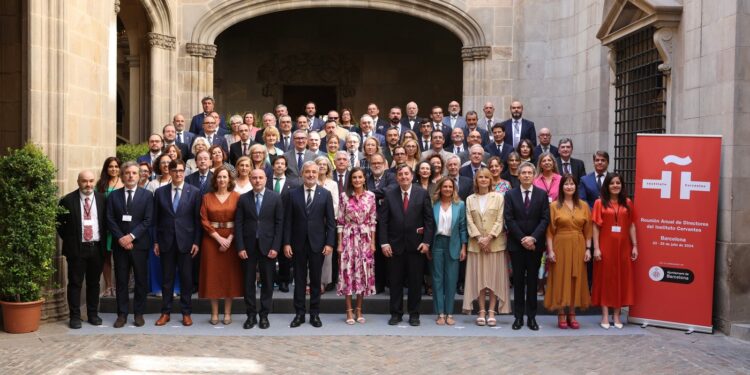The Diplomat
Her Majesty the Queen yesterday in Barcelona, urged the directors of the Cervantes Institute throughout the world to continue with their “mission of promotion and dissemination of Spanish, Hispanic cultures and co-official languages.”
Accompanied by the director of Cervantes, Luis García Montero, and the mayor of Barcelona, Jaume Collboni, Doña Letizia participated in a session on multilingualism, in which she recognized that the directors of the centers navigate many difficulties, but encouraged them to continue with his work. Also participating in the meeting, which is held annually by the directors of the Institute, the State Secretary for Ibero-America and the Caribbean and Spanish in the World, Susana Sumelzo; the Government delegate in Catalonia, Carlos Prieto Gómez; the president of the Barcelona Provincial Council, Lluïsa Moret; and the leader of the PSC, Salvador Illa.
No representative of the Government of Catalonia, nor of the political formations Junts, ERC and En Comú Podemos attended the reception of the Queen at the municipal council.
The session was held behind closed doors and began with a few words from Collboni and García Montero was in charge of moderating the interventions of the directors of the four centers that participated: Dakar (Senegal), Vienna (Austria), Budapest (Hungary) and Naples (Italy), who briefly explained the situation of the institution and Spanish in each of these four countries where they work.
For the mayor of Barcelona, ”plurality is essential to have a stronger and more united country based on the recognition of diversity, a shared project in which you recognize yourself and are recognized.”
The director of the Dakar center, Concepción Barceló, spoke about the importance of multilingualism in sub-Saharan Africa as a tool for understanding and cooperation. “The large number of local languages they use is a linguistic treasure; and learning Spanish in this reality is a powerful tool and offers them a competitive advantage, since supporting the educational development of thousands of people opens doors to new educational and cultural professional opportunities. “, indicated Concepción Barceló.
The person in charge of Cervantes in Vienna, Ignacio Martínez Castignani, explained that at his center there are a wide variety of students, Austrian, Turkish, Polish, Czech, Hungarian, Slovenian, Norwegian, or Asian. All of them, who live in a multilingual and multicultural environment – he highlighted – “choose to study at Cervantes because it is not a language school, like there are many in the city, but rather a rich space of multicultural and multilingual coexistence, which nourishes and enriches, and that is our secret formula.







